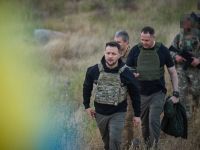U.N. weapons inspectors have not found any "smoking guns" in Iraq during their search for weapons of mass destruction, the chief U.N. weapons inspector said Thursday.
"We have now been there for some two months and been covering the country in ever wider sweeps and we haven't found any smoking guns," Hans Blix told reporters at the United Nations.
Blix and his counterpart Mohamed ElBaradei, who heads the International Atomic Energy Agency, were to brief the Security Council Thursday on their assessments of Iraq's weapons declaration.
The purpose of Thursday's Security Council meeting was to give council members an assessment of Iraq's arms declaration and update them about "our increasing capability in country, including the use of helicopters, the opening of a temporary regional monitoring center in Mosul and other steps to make us more effective," Blix's spokesman, Ewen Buchanan, said.
Asked whether inspectors were getting significant intelligence from the United States, Blix said: "Well, we are getting intelligence from several sources and I will not go into the operative part of that, but it's clear that this will be helpful in the future to us."
"We have gone to, I think, about 125 sites already, and some of them were not visited before, and there will be more. And as more intelligence comes in, there will be more sites visited. I'm confident that we will get more intelligence."
U.S. Secretary of State Colin Powell told The Washington Post on Thursday that in the past few days, the United States has started giving inspectors "significant intelligence" that has enabled them to become "more aggressive and to be more comprehensive in the work they're doing."
But Washington is holding back some information to see if inspectors "are able to handle it and exploit it. ... It is not a matter of opening up every door we have," Powell conveyed.
Blix has said his inspectors need intelligence from other nations because Iraq's weapons report leaves many unanswered questions that it is impossible to verify its claim of having no weapons of mass destruction. On Thursday, Blix reiterated that Iraq's weapons declaration was incomplete.
"We think that the declaration failed to answer a great many questions."
A senior Iraqi official denied on Thursday that the arms declaration was incomplete, as inspectors have repeatedly said, AP reported. "People who claim there were gaps, I could tell you right away they have not read it," Amir al-Saadi, Saddam's science adviser, said.
Blix is to give the council a formal report on the inspections on Jan. 27. (Albawaba.com)
© 2003 Al Bawaba (www.albawaba.com)







